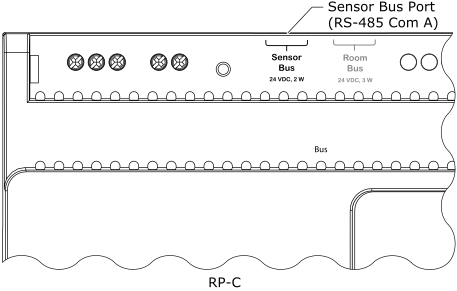
Concetto
RP-C Sensor Bus
The RP-C sensor bus allows SpaceLogic Sensor devices to be connected to the controller.
The sensor bus is a proprietary RS-485 bus, which provides both 24 VDC power supply and communications for the sensors.
The maximum total length of the sensor bus is 61 m (200 ft). The sensor bus uses a Cat 5 (or higher) unshielded, straight-through wired cable with eight conductors (four twisted pairs) and RJ45 connectors. The wire size (cross-sectional area) should be 22 to 26 AWG (0.34 to 0.14 mm²). When the RP-C controller is installed in a space that handles conditioned air or return air, the sensor bus cables and IP network cables frequently must be plenum-rated to meet applicable building codes. Per maggior informazioni, consulta Wiring .
By default, the RP-C controller's Sensor Bus port (RS-485 Com A) is configured and allocated for the sensor bus. Per maggior informazioni, consulta RP-C Communication Ports .

You can connect a single SpaceLogic Sensor to the sensor bus, or you can connect two to four SpaceLogic Sensor devices in a daisy-chain configuration.
When connecting SpaceLogic Sensor devices to the sensor bus through a daisy-chain configuration, it does not matter if the incoming and outgoing cables are connected to one or the other sensor bus port on the SpaceLogic Sensor.
The maximum number of SpaceLogic Sensor devices that can be connected to the sensor bus is variable depending on the power consumption for the selected SpaceLogic Sensor model and the combination of cover and sensor base type.
When calculating the power consumption to validate your sensor bus configuration, ensure that you add the power consumption (mW) for all SpaceLogic Sensor models, sensor bases, and covers used on the sensor bus to determine the total power consumption. The sensor bus can supply maximum 2000 mW. SpaceLogic Sensor combinations totalling more than 2000 mW are not supported. The following table can be used for calculating the total power consumption.
|
Description |
Model Number |
Power (mW) |
|
Sensor base with temperature sensor |
SXWSBTXXXSXX |
90 |
|
Sensor base with temperature and humidity sensors |
SXWSBTHXXSXX |
90 |
|
Sensor base with temperature and CO 2 sensors |
SXWSBTXCXSXX |
490 |
|
Sensor base with temperature, humidity, and CO 2 sensors |
SXWSBTHCXSXX |
490 |
|
Blank cover |
SXWSCBXSELXn a |
0 |
|
Blank cover with occupancy sensor |
SXWSCBPSELXn a |
20 |
|
3-button cover (buttons for override and setpoint control) |
SXWSC3XSELXn a |
190 |
|
3-button cover (buttons for override and setpoint control) with occupancy sensor |
SXWSC3PSELXn a |
210 |
|
Touchscreen display cover |
SXWSCDXSELXn a |
190 |
|
Touchscreen display cover with occupancy sensor |
SXWSCDPSELXn a |
210 |
|
Touchscreen display cover with light control buttons |
SXWSC2XSELXn a |
190 |
|
Touchscreen display cover with light control buttons and occupancy sensor |
SXWSC2PSELXn a |
210 |
|
Touchscreen display cover with light and blind control buttons |
SXWSC4XSELXn a |
190 |
|
Touchscreen display cover with light and blind control buttons and occupancy sensor |
SXWSC4PSELXn a |
210 |
|
Complete SpaceLogic Sensor model with temperature sensor, buttons for override and setpoint control, and LCD display cover |
SXWSATXXXSLn a |
80 |
|
Complete non-communicating b SpaceLogic Sensor model with resistive temperature sensor (10 kohm type 3 thermistor) and blank cover |
SLAnXXX c SXWSATXXXRXX d |
0 |
|
SpaceLogic Bluetooth Adapter e |
SXWBTAECXX10001 |
300 |
- The last character (“n”) of this model number indicates the housing: X (Medium matte white), W (Optimum glass white), or B (Optimum glass black).
- The SpaceLogic resistive temperature sensor is not designed to be connected to the sensor bus, but instead is connected to I/O points/terminals on the BACnet/IP controller using a two-wire connection.
- The fourth character (“n”) of this model number indicates the housing: S (Medium matte white), W (Optimum glass white), or B (Optimum glass black).
- The model number SXWSATXXXRXX is replaced by SLASXXX.
- Connect the SpaceLogic Bluetooth Adapter to the SpaceLogic Sensor for temporary commissioning and servicing only.
To summarize the power conditions, the sensor bus supports the following key SpaceLogic Sensor combinations:
Blank covers: Up to four sensors of any combination of sensor base types
3-button and touchscreen covers:
Up to two sensor bases with CO 2 option
Up to four sensor bases without CO 2 option
SpaceLogic LCD temperature sensors: Up to four sensors are supported

Each SpaceLogic Sensor has two 2-position DIP switches, which are used to give the sensor a unique address on the sensor bus. An incorrectly configured or improper DIP switch can cause two sensors to have the same address on the sensor bus, which means that both sensors will be offline. Per maggior informazioni, consulta SpaceLogic Sensors .
SpaceLogic Sensor devices connected to the sensor bus through a daisy-chain configuration can be assigned addresses regardless of the order in which the sensors appear in the daisy chain. For example, sensor number 1 can have the address 6, sensor number 2 can have the address 4, and so on.
 Hardware Overview
Hardware Overview
 RP-Cs
RP-Cs
 Wiring
Wiring
 RP-C Communication Ports
RP-C Communication Ports
 Connecting SpaceLogic Sensor Devices to an RP-C Controller
Connecting SpaceLogic Sensor Devices to an RP-C Controller
 RP-C
RP-C
 SpaceLogic Sensors
SpaceLogic Sensors